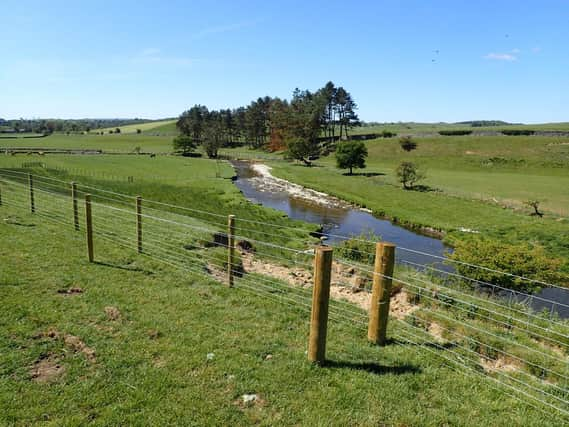New project will help farmers and landowners improve flooding risk and water quality in the Upper Aire


NatureBid, which was successfully piloted by the Yorkshire Wildlife Trust in March this year, provides funding for environmental work such as new hedgerows, buffer strips, fencing and tree planting.
Working as a ‘reverse style’ auction, farmers and landowners use the online bidding platform to put forward pieces of land where they would like the water quality or flood management works to take place and then ‘bid’ an amount they could do the work for.
Advertisement
Hide AdAdvertisement
Hide AdOut of the 64 ‘bids’ received through the pilot scheme, 43 were successful and received funding totalling £40,802.
“Following the success of the first pilot auction in spring, we’re delighted to be able to offer this funding again to farmers and landowners in the Upper Aire catchment,” said Suzie Knight, NFM project officer for the Upper Aire at Yorkshire Wildlife Trust.
“There is so much opportunity in this area to implement measures which benefit both wildlife and landowners.
“As well as improving our waterways and helping alleviate flood risk downstream, the long-term benefits of the work being done now will be enjoyed by generations to come.”
Advertisement
Hide AdAdvertisement
Hide AdNatureBid is part of the Upper Aire Project which was set up in 2011 as a collaboration between Yorkshire Wildlife Trust, Environment Agency and the Yorkshire Farming and Wildlife Partnership (YFWP), with the aim of addressing watercourse failures along the Aire.
River health assessments by the Environment Agency had shown that much of the Upper Aire catchment was “adversely affected” by the impacts of sediment and diffuse pollution – the combined effects of erosion, flooding, and run-off from rural land.
Practical measures such as leaving a buffer strip between grazed land and a watercourse can help improve water quality by catching the run-off from fields before it reaches the water.
Planting natural grass, trees and shrubs help reduce the water run-off from flat ground surfaces and keeping livestock away from river banks prevents trampling and allows vegetation to regrow naturally.
Advertisement
Hide AdAdvertisement
Hide AdThe Yorkshire Wildlife Trust said many of the measures which benefit water quality also have natural flood management benefits. Trees and hedges taking up water through their roots and as a tree canopy grows, it slows the speed rainwater hits the ground.
The roots also create fissures or mini tunnels into the ground which help the water filter down and slows how much runs straight off the land into rivers. This all contributes to not only improving water quality but helping to protect downstream urban areas from flooding.
Phil Lyth from the Yorkshire Farming and Wildlife Partnership, described NatureBid as a “great new funding opportunity”.
“It allows farmers and landowners to take the lead in identifying and carrying out works on their land to benefit the environment and their businesses,” he said.
Advertisement
Hide AdAdvertisement
Hide AdDeveloped in partnership with the Environment Agency and environmental charity, the Sylva Foundation, Iain McDonell, Environment Agency senior environment officer for agriculture, said the project offered an “innovative way” of providing funding.
“It will enable landowners and farmers on the Upper Aire to deliver enhancements for the environment that work for their land more easily,” he said.
Mr McDonnell added that the scheme is one part of the “wide range” of measures to improve the region’s “resilience” to the impacts of climate change.
“It will accelerate efforts to reach net zero and help achieve the government’s 25-Year Environment Plan goals for nature through effective nature-based solutions.”
Advertisement
Hide AdAdvertisement
Hide AdProjects which received funding through the pilot scheme are already underway.
The National Trust put in a successful bid for fencing to protect one of Yorkshire’s beauty spots with area manager, Roisin Black, praising the process.
“We received some funding to cover the costs of fencing off a small section of Malham Beck; the process was clear. The team at NatureBid really wanted to help and were there if you needed anything.
“The funding was allocated in a very fair manner – everyone has to follow the same rules and guidelines. We would very much be in favour of trying a system like this again in the future.”